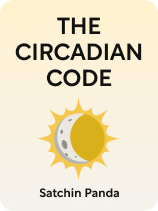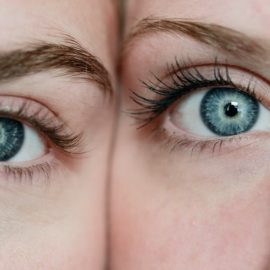

This article is an excerpt from the Shortform book guide to "The Circadian Code" by Satchin Panda. Shortform has the world's best summaries and analyses of books you should be reading.
Like this article? Sign up for a free trial here.
Are you struggling to feel energized throughout the day? Could your daily habits be disrupting your body’s natural rhythm?
The Circadian Code, a book by Satchin Panda, explores how modern lifestyles clash with our internal 24-hour clock. Panda offers simple adjustments to align your eating, sleeping, light exposure, and exercise habits with your body’s natural rhythm.
Keep reading to discover how small changes can lead to big improvements in your health and energy levels.
The Circadian Code Book Overview
How often do you feel truly rested and energized throughout the day? If your answer is “sometimes” or “rarely,” it might be because your circadian rhythm—your body’s natural 24-hour clock—has been disrupted. The Circadian Code, a book by Satchin Panda, explains that modern habits, like irregular sleep schedules, late-night eating, and excessive exposure to artificial light, throw off your circadian rhythm and can cause various health problems. Panda suggests simple adjustments you can make to your daily habits to live in sync with your circadian rhythm and be your healthiest and most energized self.
Panda is a biology professor working in the Regulatory Biology Laboratory at the Salk Institute for Biological Studies in California. He’s a Pew Scholar and the recipient of The Julie Martin Mid-Career Award in Aging Research. He designed an app called myCircadianClock that helps people track their lifestyle habits, understand their circadian rhythms, and contribute their data to research on health and circadian rhythms.
In this overview, we’ll first discuss how your circadian rhythm works and what happens when your lifestyle habits go against this rhythm. Then, we’ll explore ways to sync your eating, sleeping, light exposure, and exercise to your circadian rhythm.
What’s Your Circadian Rhythm?
Panda explains that your circadian rhythm is the internal 24-hour schedule that guides your body through the daily tasks needed to keep you healthy. This schedule, also called your internal clock, controls almost every aspect of your health and functioning, such as when to sleep, digest foods, and produce different hormones. Your body can’t accomplish all of its needs at once, so it must perform different functions during different times of the day.
How Lifestyle Habits Disrupt Your Circadian Rhythm
Panda argues that many modern lifestyle habits clash with our bodies’ natural circadian rhythms. Humans evolved to eat and work during the day and sleep at night, and this is the daily pattern that our bodies function best on. However, the discovery of fire allowed humans to defy their internal clocks by staying awake when it’s nighttime. Today, with technology and cheap electricity, we regularly disrupt our circadian rhythms.
Panda identifies four modern habits that disrupt your circadian rhythm:
- Eating at any hour of the day or night
- Going to bed late, sleeping in, and not getting enough sleep
- Not getting light exposure at the right times
- Not getting enough exercise
What Happens When Your Circadian Rhythm Gets Disrupted
Panda writes that disrupting your circadian rhythm can have many negative consequences for your health. It can increase the risk of various health issues, such as gastrointestinal disorders, obesity, diabetes, and cardiovascular problems. An unhealthy circadian rhythm can also lead to mental illnesses like depression and anxiety.
Panda warns that because a disrupted circadian rhythm can significantly harm your health, you must maintain a healthy rhythm by living in accordance with your clock. We’ll explore how to align your eating, sleeping, light exposure, and exercise with your circadian rhythm.
Sync Your Eating
To sync your eating with your circadian rhythm, Panda advises that you only eat when your body is prepared to digest foods. He explains that your digestive system isn’t designed to work all the time—it needs time to rest to function optimally. Eating when your body isn’t ready can lead to improper digestion and can overwork or damage your digestive system.
Panda suggests three eating habits that help maintain healthy digestive cycles: 1) Keep a regular eating schedule, 2) avoid late-night snacking, and 3) eat within a specific window each day.
Habit #1: Keep a Regular Eating Schedule
First, Panda recommends you stick to a regular meal schedule. When you eat around the same times every day, your body can process foods most efficiently and effectively. Your body learns when to expect food intake and prepares in advance to digest it—for instance, your stomach might produce more acid.
Panda adds that having breakfast at a consistent hour is especially important because it calibrates your circadian rhythm with the outside world. The first thing you eat or drink each day—apart from water—signals to your body that the day has begun and that it’s time to start daytime functions, such as releasing hormones for alertness and ramping up your metabolism.
Habit #2: Stop Late-Night Eating
A second habit Panda suggests you adopt is to avoid eating anything two to four hours before bedtime. Your body shifts its focus from digestion to rest and repair after your last meal of the day so it can work on important tasks during sleep—like repairing damaged cells and growing healthy gut bacteria. So, if you eat after this shift happens, you interrupt your digestive system’s healing time and force it to process food when it isn’t prepared to do so.
Panda writes that eating when your digestive system isn’t prepared to process food can lead to indigestion and weight gain. Let’s explore why.
Indigestion
First, eating late causes indigestion because the gut muscles that push food through your intestines are less active at night, meaning food moves slower through your digestive tract. Additionally, when you’re standing or sitting during the day, gravity helps pull food downward through your digestive system. However, when you’re lying down to sleep, this gravitational effect is reduced, slowing digestion. Panda adds that at night, your body makes more stomach acid and less saliva to balance it out, which can make acid reflux worse if you eat late.
Weight Gain
Second, Panda writes that late-night eating causes weight gain because it disrupts your body’s natural fat-burning process. He explains that your body typically starts to burn fat only a few hours after you’ve last eaten. When you eat late at night, you reset this timer, preventing your body from entering this fat-burning mode. If you regularly eat late, you repeatedly interrupt this process, which can lead to weight gain and related health issues like insulin resistance.
Habit #3: Eat Within a Specific Window
Panda recommends a third habit for healthy circadian eating: Consume all your food within a 12-hour or shorter window each day—a technique known as time-restricted eating (TRE). Eating within a set window allows your digestive system to take a break. This rest period gives your body time to repair damaged gut cells, which reduces inflammation and improves your overall health.
Panda elaborates that when you eat is just as important, if not more, than what you eat. In one of his studies, Panda fed mice the same diet rich in fat and sugar, but he varied their feeding times. The group of mice that ate all their food within a set eight- to 12-hour window each day maintained their weight and had healthy blood sugar and cholesterol levels. However, the group that ate freely throughout the day showed signs of poor health, despite having the same diet as the other mice.
If you’d like to implement TRE, Panda suggests starting with a 12-hour eating window each day, beginning with breakfast and ending with dinner—such as 8:00 a.m. to 8:00 p.m. Gradually reduce the window by an hour per week until you’re eating within a span of eight to 11 hours. The benefits of TRE grow for every hour you reduce your eating window, but it’s okay to go back to an 11- to 12-hour window once you’ve achieved your desired weight and want to maintain it.
Keep in mind that consuming anything other than water counts as eating—including coffee, alcohol, and snacks. Over time, you should naturally feel less hungry after dinner and crave fewer unhealthy foods.
Sync Your Sleep
Panda writes that in addition to aligning your diet with your circadian rhythm, you should also align your sleep. Your body prepares for the next day during sleep, so the quality of your sleep affects how well you function and feel the next day.
When you don’t get enough rest, your mood and performance suffer. You might make poor decisions, forget things, fall into bad habits, and eat more poorly. Panda suggests that sleep issues can also contribute to health problems like stomach issues, weight gain, diabetes, and heart disease. If you feel sleepy during the day and don’t wake up feeling refreshed, your sleep habits are probably out of sync with your circadian rhythm.

———End of Preview———
Like what you just read? Read the rest of the world's best book summary and analysis of Satchin Panda's "The Circadian Code" at Shortform.
Here's what you'll find in our full The Circadian Code summary:
- The modern habits that disrupt your circadian rhythm
- How your internal 24-hour schedule works
- The little habits that will recharge your battery






